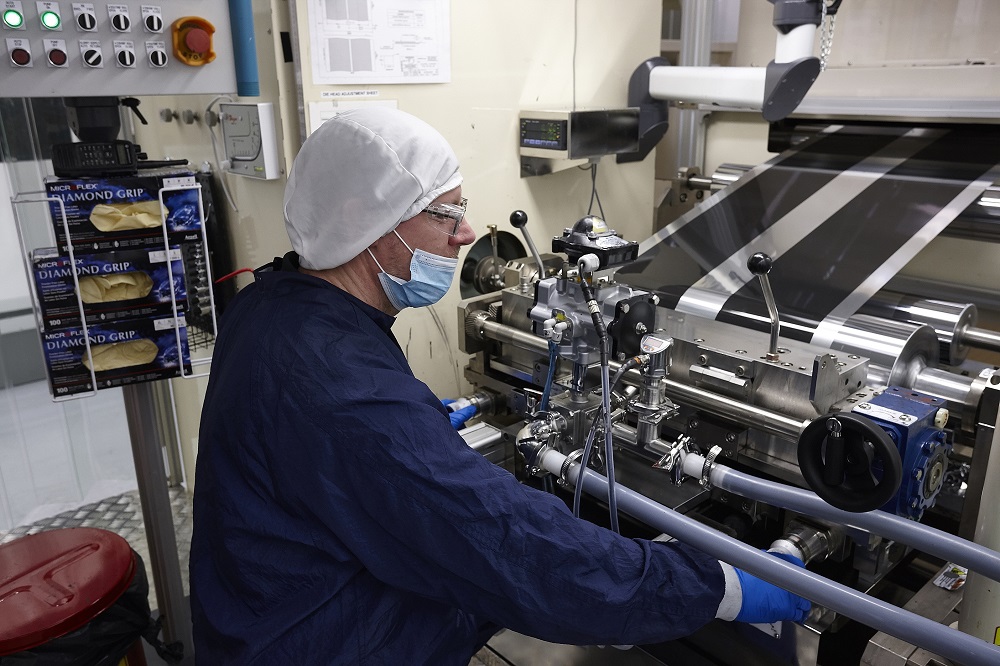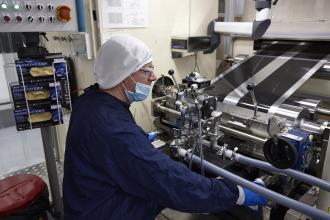Obtain news and background information about sealing technology, get in touch with innovative products – subscribe to the free e-mail newsletter.
10.08.2021 Press Release
Closing in on Circular Success
Working with the ReCell Center*, XALT Energy is providing material resources and proof-of-concept testing to validate a simple separation process that allows for direct recycling of manufacturing scrap electrode materials into new battery electrodes. If successful, the process could create a significant cost benefit for battery manufacturers by reducing the amount of virgin raw material used in production. In addition, with supply chains for critical materials such as nickel-manganese-cobalt oxide (NMC) still being established, advanced recycling could significantly reduce the volume of materials being globally shipped, reducing transportation emissions and energy costs.
XALT Energy experts at the company’s Auburn Hills Technology Park have been testing recycled NMC electrodes produced by the ReCell Center’s process and “the results look promising,” says John Camardese, Director of Cell Development at XALT Energy. “This technology would enable us to directly recycle our coated scrap to recover expensive NMC for use in slurry. This will be a real game changer."
The Right Time
Fortunately for the lithium-ion battery industry, the ReCell Center’s game changing technology is emerging at the right time. Efforts to promote carbon-neutral energy strategies that lower CO2 emissions are being globally pursued. In response, key industries, including transportation, are investing heavily in alternate powertrain technologies. Global demand for lithium-ion batteries is expected to rise from 230 GWh in 2020 to 1,700 GWh in 2030, according to industry analysts at IHS Markit, with new battery electric vehicles driving much of this demand. At this growth rate, IHS Markit analysts note, recycling will need to dramatically increase to keep up with such material demands.
ReCell Center scientists based at the DOE’s Argonne and Oak Ridge National Laboratories in Illinois and Tennessee agree. In an effort to get in front of this challenge, they proposed a fundamental research program to develop a recycling process that, unlike existing hydro- and pyro-metallurgical methods, would separate and rejuvenate cycle-damaged, nickel-manganese-cobalt foil coatings for reuse in new batteries. Without a robust source for end-of-life batteries to conduct their research, they contacted XALT about collaborating on the project. “Right now, there still aren’t a lot of end-of-life electric vehicle batteries available because they last such a long time,” said Jeff Spangenberger, director of the ReCell Center. “We needed a feedstock of battery materials in order to pursue this early-stage technology. The coated foil scrap and spent pouch cells that XALT has provided to us has enabled us to conduct this recycling program.”
The Benefits of Simple Separation
Importantly, the separation recycling process that has emerged out of collaboration with XALT Energy will offer the company several advantages when proof-of-testing validation is complete, Camardese says. This process is much less energy intensive and more sustainable than hydro- and pyro-metallurgical recycling, which uses chemicals and heat to break down and separate the material back to feedstock compounds such as metal sulfates. Several energy intensive steps are required to convert metal sulfates back into usable battery materials such as copper foil or NMC. The ReCell Center’s focus on more direct methods to separate and rejuvenate batteries will have clear cost and environmental benefits.
This is significant. Multiple analyst reports indicate that 180 kilotons (kt) of lithium, 450 kt of nickel, and 930 kt of cobalt will be needed from recycled sources to meet global lithium-ion battery requirements in 2030.
“This relationship has allowed XALT Energy to participate in the early-term, fundamental research and development of a very promising process that could significantly impact our ability to produce batteries without a total reliance on virgin raw materials,” Camardese says. “This collaboration has provided us with access and influence into the development process of important, more sustainable recycling technology.”
“At the end of the day, battery recycling needs to be profitable,” Spangenberger agreed. “Economies of scale are really going to help, but right now there are a lot of batteries out there that cost money to recycle. The work the ReCell Center and XALT Energy are doing together is helping to get us to the next level.”
*The ReCell Center, funded by the Department of Energy’s Vehicle Technologies Office, was initiated in 2019 to develop technologies and concepts that will improve the economics of battery recycling, to help reduce the cost of new batteries and to bolster the domestic U.S. battery supply chain. The ReCell Center is led by Argonne National Laboratory and includes the National Renewable Energy Laboratory, and Oak Ridge National Laboratory. More information about the ReCell Center is available at ReCellCenter.org.
Ulrike Reich
Head of Media Relations & Internal Communications
Telephone: + 49 (0) 6201 960 5713
ulrike.reich@fst.comCheryl Eberwein
Director, Corporate Communications
Telephone: +1 734 354 5373
cheryl.eberwein@fnst.comDownload Press Release
Download Images
News Service
You can subscribe to the Freudenberg Sealing Technologies news alert service, bringing you the news as soon as they are published. You can always unsubscribe from this service.
Subscribe now!Further Articles With These Taggings

First Hand News
Best of all, keep up with the latest developments
with the Freudenberg Sealing Technologies newsletter.













